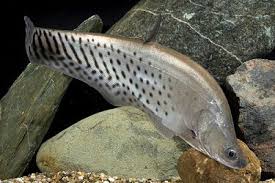1
/
of
1
Midwest Aquarium and Pond Supplier LLC
(6) Royal Clown Knifefish
(6) Royal Clown Knifefish
Regular price
$75.00 USD
Regular price
Sale price
$75.00 USD
Shipping calculated at checkout.
Quantity
Couldn't load pickup availability
The royal clown knifefish (Chitala blanci) is a large, predatory freshwater fish known for its elongated, knife-shaped body and unique pattern. It is native to the slow-moving rivers and lakes of Southeast Asia and is distinct from the more common clown knifefish (Chitala ornata
).
Appearance
- Coloration: Unlike the standard clown knifefish, which has spots, the royal clown knifefish has black diagonal or mottled patterns on a silvery-gray body.
- Size: They can reach up to 30–36 inches in length, making them a "monster fish" that is too large for the average home aquarium.
-
Body Shape:
Like other knifefish, they have a laterally compressed, knife-like body with a continuous, undulating anal fin that allows them to move gracefully both forward and backward.
Care and tank setup
- Tank size: A minimum of 200 gallons is recommended for a single royal clown knifefish. Tank length and width are more important than height to accommodate their swimming patterns.
- Lid: A tight-fitting, secure lid is essential, as these fish are known jumpers.
-
Water parameters:
They are sensitive to poor water quality, so pristine, stable conditions are a must.
- Temperature: 75–82°F (24–28°C).
- pH: 6.5–7.5.
-
Aquascaping:
Provide plenty of hiding spots with driftwood, caves, and large rocks. They prefer subdued lighting, which encourages them to come out during the day.
- Substrate: A fine, sandy substrate is ideal for their delicate skin.
Diet and feeding
- Carnivorous: Royal clown knifefish are nocturnal predators that primarily feed on live prey in the wild.
- Aquarium diet: They can be conditioned to accept frozen or meaty foods such as shrimp, chopped earthworms, or fish fillets. They may be hesitant to accept dry foods, so a varied diet of protein-rich, natural foods is often preferred.
Behavior and tank mates
- Temperament: They are generally peaceful towards similarly sized fish but will eat any fish or invertebrate that fits into their large mouth.
- Territorial: As they mature, they can become more territorial, especially towards other knifefish. It is often best to keep them as a single specimen in a large tank unless there is a significant amount of space and cover.
-
Compatible tank mates:
- Large, robust fish like oscar fish, peacock bass, large catfish, or arowanas.
-
Incompatible tank mates:
- Small fish, as they will be eaten.
- Aggressive or fin-nipping fish
Share
No reviews

